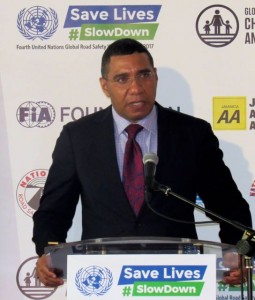
Powers of Persuasion
May 1st, 2018
I often pick up ideas from seemingly random comments on Twitter. I turn them over in my head. They coalesce, curl into a little ball. I uncurl them again later, and see if I can write about them. Many ideas can develop that way, if you give them the chance.
So, a tweet from environmentalist Diana McCaulay recently struck a chord. Prime Minister Andrew Holness had posted a short video, in which he urged Jamaicans to take care on the roads. “Slow down!” he intoned. Ms. McCaulay promptly responded with the suggestion that, actually, “urging” people not to do something doesn’t work too well. In the case of the mayhem on the roads, enforcing the law would be most effective.

NEPA’s Patrice Gilpin and her colleague, wearing T shirts urging us to say NO to open burning. (My photo)
In many other cases, too, where Jamaicans are beseeched to “do the right thing” of their own free will, some stringent application of the law would work wonders. For example, the National Environment and Planning Agency (NEPA) is currently conducting a campaign to stop the burning. I hope people are listening, as this is so important (as is slowing down on the roads, and many other responsible things). However sincere the persuaders are, though – I have a feeling that some people will only stop setting light to things if they happen to burn their own houses down in the process. Then they will understand. However, if you learn the hard way it could be too late. And hey, there are environmental laws prohibiting open burning. But, guess what? They are not enforced.
Do the exhortations “Stop!” and “Don’t!” actually work, though? Perhaps, on a few enlightened ones. Those who are “woke,” as the saying goes.
As Chairman of the National Road Safety Council (NRSC) we know the Prime Minister must do all he can. “Observe the rules of the road,” he said, repeating the mantra on some of those billboards we see all over town about buckling up, wearing our crash helmets, etc. Finally, the catch phrase: “Arrive alive!”
It’s amazing, isn’t it, that even the fear (or possibility) of death will not stop people from driving like the star of the Fast and Furious film series (who met his own untimely death as a passenger in a speeding car). You would think that would be enough of a trigger: “Hey! You might actually die if you continue to behave this way!”
Which leads me to this concept of “discipline.” This is a word that Jamaicans commonly use with respect to children; we have Deans of Discipline in our schools. But grownups driving cars around are a different kettle of fish. An admonishment such as: “You must be more disciplined on the road!” just isn’t going to cut it. The average grownup will shrug, and continue on his merry way, whether disciplined or badly behaved. The only thing that will stop him is if a policeman catches him, hauls him up in court and gives him a hefty fine. Not only him/her, but also all the other rampant motorists and bikers.
About a year ago, I attended a high-profile event at the Office of the Prime Minister on road safety. There were several eloquent spokespersons there, including the PM himself. The hashtag was – yes, you have guessed it: #SlowDown. One year later, people don’t seem to be doing it. Why not?
Advertising professionals know all about the different levels, the subtleties of persuading the general public to buy this or that product. Perhaps that is easier than the “moral suasion” that the Prime Minister has to resort to. Somehow, a carefully crafted television ad about a hideous soft drink can tug at the heart strings, or make one laugh. An ad can even fill one with outrage and sadness – especially if it is on behalf of hungry children in the Philippines, who never blink when they look in the camera; or puppies with bandages on their feet.
Ads have little effect on me. I’m not sure why. I always press the mute button when they come on. Some of them – especially those with annoying people jumping up and down and loud music – irritate me terribly. I think I am unusual though; my husband often says to me, “Isn’t that a good ad?”
“I wouldn’t know,” I say, thumb held firmly on the mute button. I am not open to being persuaded.
The thing is, with “moral suasion” – you can take it or leave it. Most people just leave it. They need to be given that extra incentive to take it. It’s no wonder we have “behaviour change specialists” in various organisations and government agencies, these days. It’s a tough one.
Tags: advertising, Andrew Holness, behaviour change, children, National Environment and Planning Agency, National Road Safety Council, NEPA, open burning, Prime Minister, road safety, social media, Twitter, UNICEF Jamaica
The Gleaner reserves the right not to publish comments that may be deemed libelous, derogatory or indecent.
To respond to The Gleaner please use the feedback form.
One Response to “Powers of Persuasion”
- We Are the Zoomers
- Living Online with Humans and Birds: NAOC 2020
- Human Trafficking and the Problem of Public Education
- Down Memory Lane
- Are We Ready to Recover from COVID-19?
- Road Safety Matters: Is Your Vehicle Safe?
- Sexual Harassment, Me Too, and the Minister’s Disturbing Giggle
- The Vulnerable Senior Citizens, Private Care Homes and COVID-19
- A Muddle Over Masks
- Here is Something Life-Saving You Can Do: Give Blood!





[…] Behavior change is difficult, we know. But with the right incentives and the right kind of leadership on the ground, it can be achieved. The community members from Nine Miles in St. Ann, who attended the film show, had their priorities straight and had put the “infrastructure” (to coin a word that our Tourism Minister is fond of) in place to make the whole area a more pleasant place for Bob Marley fans and others to visit. Nine Miles is the site of Marley’s mausoleum. Anywhere related to Marley is automatically a major tourist attraction, as I am sure our politicians know. […]